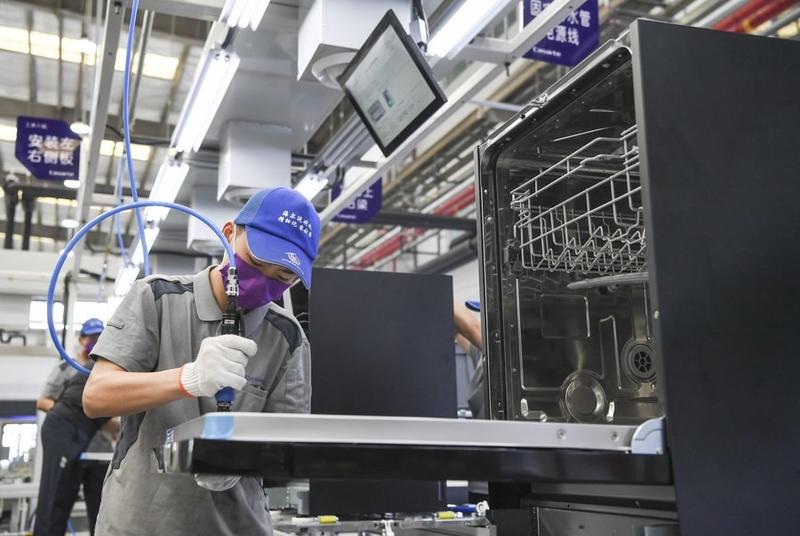 In this Sept 25, 2022 photo, a worker is seen at the production line of a dishwasher interconnected factory of Chongqing Haier Washing Electric Appliances Co, Ltd in southwest China's Chongqing. (WANG QUANCHAO / XINHUA)
In this Sept 25, 2022 photo, a worker is seen at the production line of a dishwasher interconnected factory of Chongqing Haier Washing Electric Appliances Co, Ltd in southwest China's Chongqing. (WANG QUANCHAO / XINHUA)
BEIJING – China's factory activities returned to expansion territory in September, with most industries showing improved sentiment, as the recovery momentum of the world's second-largest economy continues to consolidate.
The purchasing managers' index (PMI) for China's manufacturing sector came in at 50.1 in September, up from 49.4 in August, data from the National Bureau of Statistics showed Friday.
A reading above 50 indicates expansion, while a reading below 50 reflects contraction.
"As policies and measures to stabilize the economy continue to take effect this month, and the negative effects of heatwaves wane, the manufacturing PMI has bounced back to expansion territory," said Zhao Qinghe, senior statistician at the bureau.
Business activities of manufacturing companies have picked up pace as the manufacturing sector enters peak season, Zhao said.
ALSO READ: China's manufacturing PMI sustains expansion
The sub-index for production reached 51.5 in September, up 1.7 points from the previous month. Specifically, the PMI of industries such as food and beverages, medicine, and equipment manufacturing rose to above 54, indicating expanded production.
Demand continued to improve, as the sub-index for new orders rose 0.6 points from August to 49.8.
The foundations of economic recovery will be further consolidated, as supporting policies continue to take effect.
Fu Linghui, National Bureau of Statistics.
Although the sub-index of new orders remained below the boom-bust line, the country's demand contraction has narrowed as supporting policies were implemented to push up domestic demand, said Zheng Houcheng, director of Yingda Securities Research Institute.
In September, the PMI for large enterprises edged up 0.6 points to reach 51.1, remaining in the expansion area for two consecutive months.
The business environment of large enterprises has secured its position above the boom-bust line, thanks to a flurry of successive policies from the government to stabilize the economy since late August, said Wen Bin, chief analyst at China Minsheng Bank.
Positive effects of the policies are also rippling through medium and small enterprises, as the PMI of medium and small enterprises rose 0.8 points and 0.7 points, respectively, compared with that in August.
The confidence of manufacturing companies has strengthened in September, with the sub-index for production and operation activity expectation standing at 53.4, up 1.1 points from the previous month.
Enterprises in industries including agricultural and sideline food processing, automobile, and railway were especially upbeat about the market prospects, as their index for production and operation activity expectation stayed above 58 in September.
"The foundations of economic recovery will be further consolidated, as supporting policies continue to take effect," said Fu Linghui, an official with the NBS.
Non-manufacturing PMI down
Friday’s data also showed the PMI for non-manufacturing sector coming in at 50.6 in September, down from 52.6 in August.
The construction sector maintained brisk expansion in September, with the sub-index for business activities reaching 60.2, 3.7 percentage points higher than the August level, according to the NBS.
Zhao cited the business activities sub-index for civil works had reached a four-month high of 61 this month and that the recent policy support has prompted the progress of infrastructure projects and activities in the construction sector.
The service sector was weaker this month as the epidemic and other factors weighed on market activities. The sub-index for business activities declined 3 percentage points from last month to 48.9.
READ MORE: China's manufacturing PMI rebounds to expansion zone
Zhao attributed the decline to tepid performance in consumer service businesses such as retailing, aviation, transportation, hospitality, catering, and resident services.
But the business volume for producer services like postal services, monetary, and financial services maintained fast expansion, he said.
Service companies remained confident over future business recovery, the data showed. In September, the sub-index for business expectations of the service sector stood at 56.1, and that for postal service, monetary, financial services, and insurance services topped 60.


